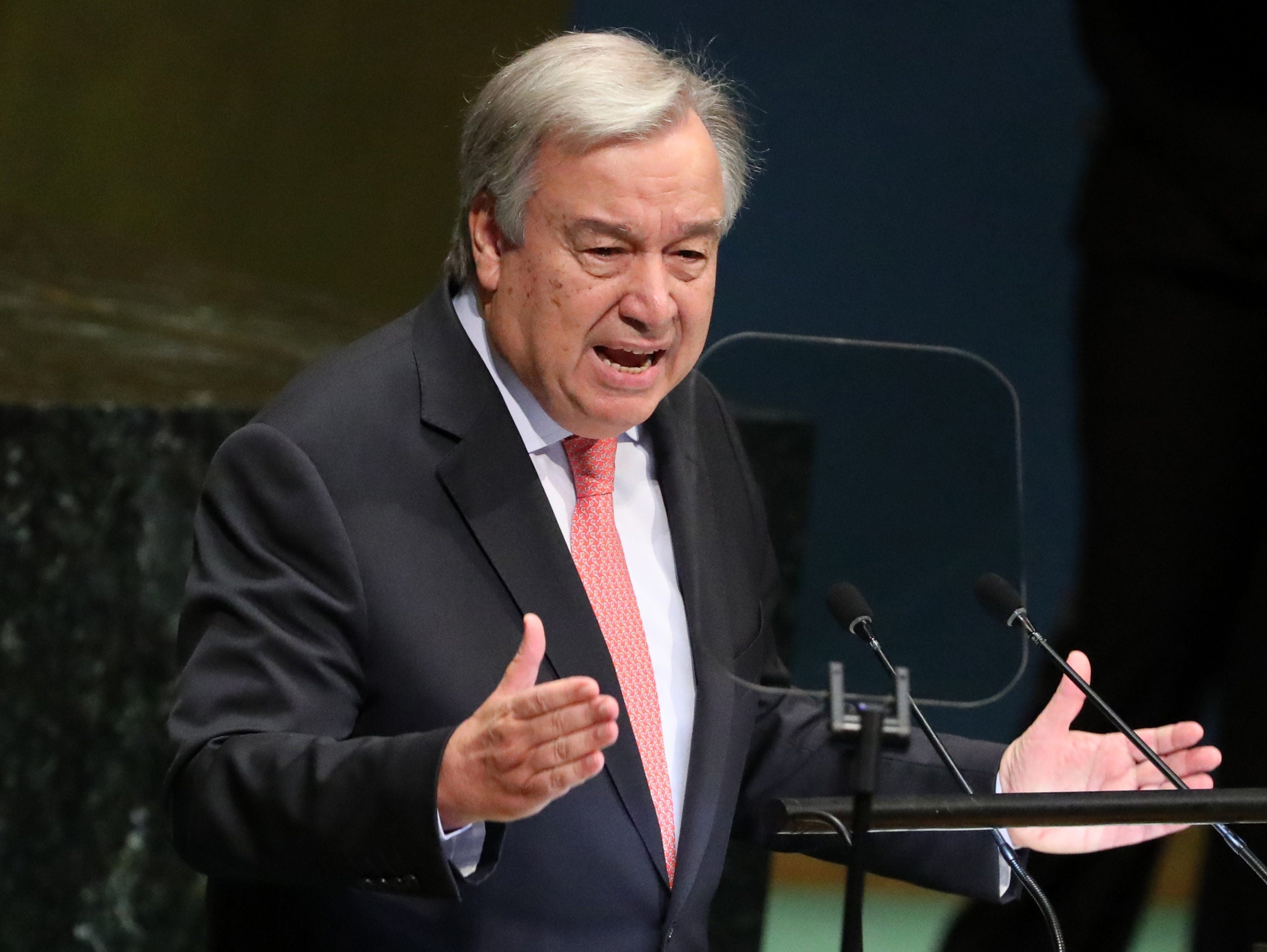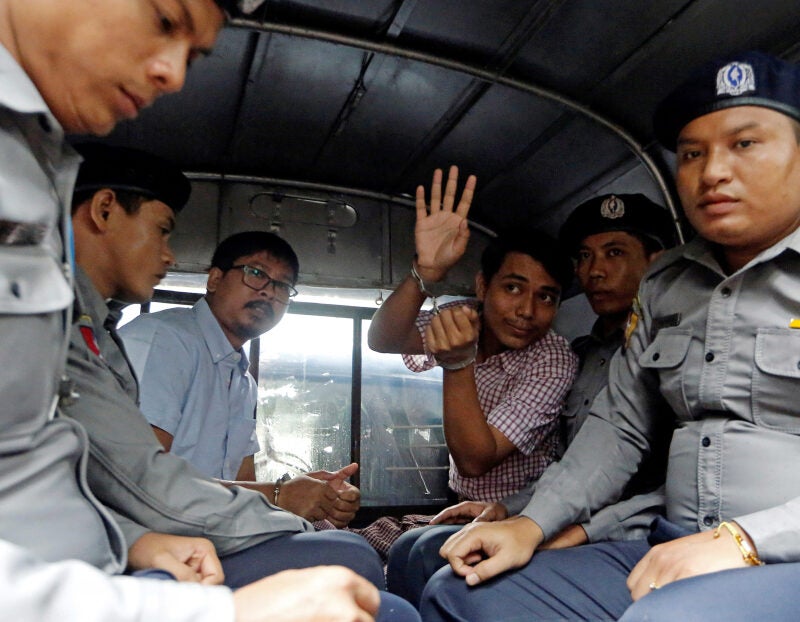
The world’s top diplomat has called on Myanmar to pardon and release two Reuters reporters who were sentenced to seven years in prison in Myanmar (formerly Burma) earlier this month.
United Nations Secretary-General Antonio Guterres (pictured) told reporters it was “not acceptable” that Wa Lone and Kyaw Soe Oo had been jailed for reporting on violence against Rohingya Muslims.
The reporters, who have been detained since their arrests in December and who both have young families, pleaded not guilty but were convicted by a judge of violating the colonial-era Official Secrets Act through illegal possession of official documents.
The reporters always maintained that they were handed the documents by police unsolicited shortly before their arrests. They had been investigating the killing of ten Rohingya Muslim men and boys by security forces in Rakhine State.

Detained Reuters journalist Wa Lone (centre, left) and Kyaw Soe Oo sit beside police officers as they leave Insein court in Yangon, Myanmar July 9, 2018. Picture: Reuters/Ann Wang
Speaking at the United Nations as it opened its General Assembly session on Thursday, Reuters reported that Guterres said: “It is not acceptable to have the journalists of Reuters being in jail for what they were doing.
“It is my deep belief that that should not happen and I hope that the government will be able to provide a pardon to release them as quickly as possible.”
Guterres was responding to questions about recent comments from Myanmar’s leader Aung San Suu Kyi, who said Lone and Soe Oo had broken the law and that their conviction had “nothing to do with freedom of expression at all”.
“They were not jailed because they were journalists, they were jailed because… the court has decided that they have broken the Official Secrets Act,” she said.
The reporters have “every right to appeal the judgement and to point out why the judgement was wrong”, she added.
At the time, US ambassador to the United Nations Nikki Haley said Suu Kyi’s words were “unbelievable”.
She wrote on Twitter: “First in denial about the abuse the Burmese military placed on the Rohingya, now justifying the imprisonment of the two Reuters reporters who reported on the ethnic cleansing. Unbelievable.”
Also on Thursday, UK Foreign Secretary Jeremy Hunt said during his visit to Myanmar that he was “extremely concerned” about the case and had raised it in a meeting with Suu Kyi, asking her to consider pardoning the reporters.
“She indicated that the judicial processes would probably need to be concluded before that could be considered, but I did put that squarely on the table as something I hoped she would consider,” Hunt said in an interview with Reuters at the end of his visit.
“This is a critical moment for Burma as one of the newest democracies in the world to show that its court system is effective and there is due process, and I think there are a number of grounds for concern that that didn’t happen in this case.”
In a statement released after he visited Rakhine State, Hunt also addressed the Rohingya crisis on which Lone and Soe Oo had been reporting.
He said: “What is essential now is that the perpetrators of any atrocities are brought to justice, because without that there can be no solution to the huge refugee problem.
“We will use all the tools at our disposal to try and make sure there is accountability.”
The International Observatory of Human Rights has organised a protest petitioning for the release of Lone and Soe Oo outside the Myanmar embassy in London to take place on Thursday at 11am.
The group said: “These journalists are just the latest in a long line of human rights violations in Myanmar and we felt that it was important to make a stand against this travesty of justice to support freedom of expression.”
The Committee to Protect Journalists is hosting a panel discussion during the UN General Assembly in New York on Friday to highlight threats to press freedom globally, with an emphasis on Myanmar.
The group said: “The cases of Reuters reporters Wa Lone and Kyaw Soe Oo are emblematic: they were set up by Myanmar police, falsely arrested, convicted under Myanmar’s Official Secrets Act, and sentenced to seven years of hard labor, all in a protracted effort to silence their truthful reporting.”
It will be the first time that human rights lawyer Amal Clooney, who is representing the two reporters, will speak publicly about the case, alongside Reuters editor-in-chief Stephen Adler and Committee to Protect Journalists executive director Joel Simon.
Myanmar has also been criticised this month for imposing a seven-year jail sentence on columnist Ngar Min Swe who was found guilty of writing “abusive” Facebook posts about Suu Kyi.
Min Swe, who used to write for pro-government newspaper Global New Light of Myanmar, was arrested on 12 July after posting a comment criticising a kiss on the cheek received by Suu Kyi from former US president Barack Obama four years ago.
Daniel Bastard, the head of the Asia-Pacific desk at Reporters Without Borders, said: “However unacceptable the conviction of the two Reuters reporters may be, the sentence imposed on the columnist Ngar Min Swe is totally disproportionate.
“His posts hostile to Aung San Suu Kyi’s reform movement may have been questionable, but the sentence he has received sets a worrying precedent. It raises serious doubts about the independence of the judicial system in Myanmar.
“For this reason, we are requesting an immediate review of the charges against him. Above all, it is high time the government repealed the archaic law on sedition that was used to convict him.”
Picture: Reuters/Shannon Stapleton
Email pged@pressgazette.co.uk to point out mistakes, provide story tips or send in a letter for publication on our "Letters Page" blog
